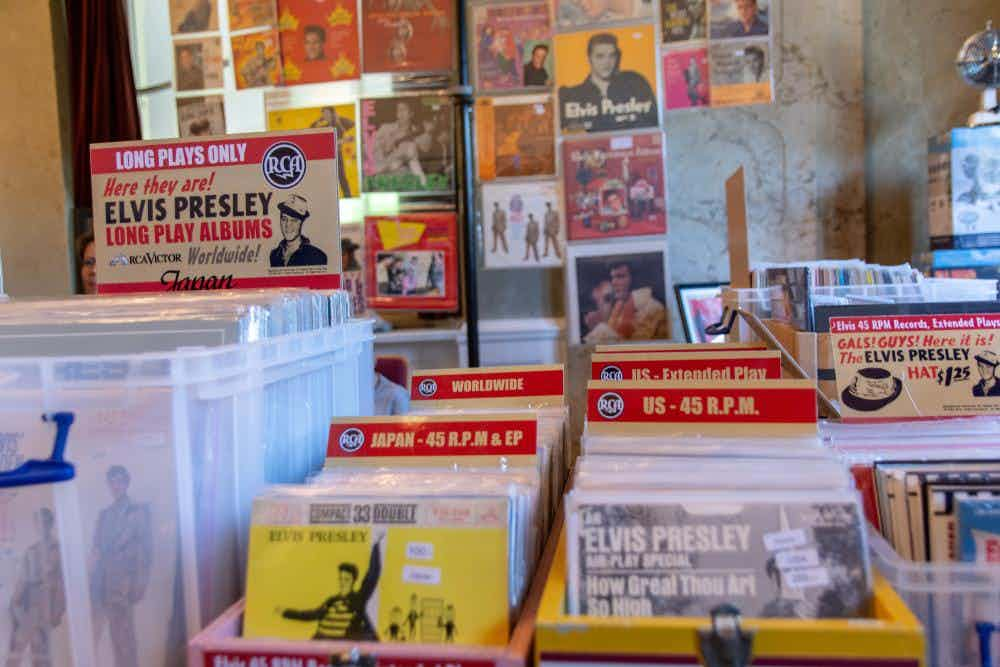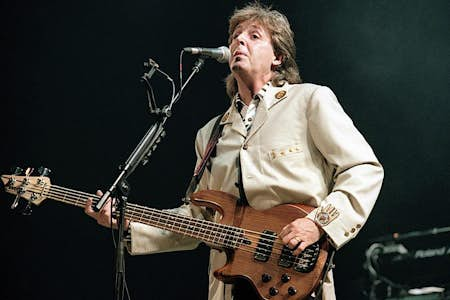Just how do you pick the 30 greatest albums of all time?
I took on the challenge, with the caveats that a) I didn’t have to rank them in any particular order, b) I could stick to the 20th century, and c) I was allowed honourable mentions.
As such, this is quite the list.
Enjoy!
The 1950s
In the Wee Small Hours - Frank Sinatra (1955)
By the early 1950s, Sinatra's career as a teen-idol was declining. He was four years into a relationship with Ava Gardner that was explosive and violent. Both had had extra-marital affairs, none more public than the one Gardner had with bullfighter Luis Miguel Dominguin, as the album was being planned. Sinatra had always tried to deliver albums that were more than a collection of unrelated songs. In the Wee Small Hours combined themes that echoed his life, loneliness, love turned bad, despair and introspection, all of which he delivers with aplomb. Sinatra broke new musical boundaries with In the Wee Small Hours, and this album shattered the myth that boys don't cry.
Elvis Presley - Elvis Presley (1956)
Elvis' debut album was released in March 1956 and spent 10 weeks at number one on the Billboard chart, making it the first rock and roll album to have reached the top spot. It was recorded over four days in January 1956, with RCA keen to capitalise on the success of the single Heartbreak Hotel. At the time of recording, tracks considered more commercial were released as singles and weren't included on albums. But on Elvis Presley, side one opens with Blue Suede Shoes (Elvis took it to number 20, although it topped the chart for Carl Perkins). Side two features the manic rocker that months earlier had propelled Little Richard to fame, Tutti Frutti. Elvis Presley eventually became the first RCA pop album to earn over $1 million. Thank you very much!
Lady Sings the Blues - Billie Holiday (1956)
This album is such a classic that it is difficult to imagine it ever not being here. It was recorded three years before Holiday's death in 1969. Although drug use, alcohol, and destructive relationships had started to take their toll on her health, her delivery and improvisation are still remarkable. Lady Sings the Blues features some classic tracks, but the most notable is Strange Fruit, which is based on a 1937 poem about the lynching of black Americans. The song is so synonymous with Billie Holiday that in 2003 a recording was included in the National Recording Registry, a US list of sound recordings considered "culturally, historically or aesthetically significant").
Kind of Blue - Miles Davis (1959)
Mark Twain said, "Wagner's music is better than it sounds." This sums up my feelings about jazz, certainly this type of modal jazz. Kind of Blue was recorded in two sessions over two days. The musicians involved - saxophonists John Coltrane and Julian "Cannonball" Adderley, pianist Bill Evans, bassist Paul Chambers, and drummer Jimmy Cobb - had little rehearsal nor idea of what they were going to do before recording started. Nonetheless, Kind of Blue is considered one of the greatest jazz records ever. Despite my inability to understand what jazz is all about, it makes the list.
Honourable Mentions
- Come Fly with Me - Frank Sinatra.
- Here's Little Richard - Little Richard.
- Chuck Berry is on Top - Chuck Berry.
- Blue Train - John Coltrane.
- The Genius of Ray Charles - Ray Charles.
- Go Bo Diddley – Bo Diddley.
The 1960s
Blonde on Blonde - Bob Dylan (1966)
One of the first double albums and often cited as one of the best albums by a twentieth-century musical giant. Blonde on Blonde is the third in a trilogy of rock albums released after Dylan had shocked the world when he went electric in 1965. When Dylan toured the album, he was joined by a group of musicians that had played on the album. They were called the Hawks and later became known as “The Band.” The album has two tracks - Just Like a Woman and Visions of Johanna - that appear in Rolling Stone's 500 Greatest Tracks. Dylan said: "The closest I ever got to the sound I hear in my mind was on individual bands in the Blonde on Blonde album."
Pet Sounds - The Beach Boys (1966)
Brian Wilson's goal in creating Pet Sounds, much of which he produced while the rest of the group were away touring, was to "create the greatest rock album ever made." Their earlier music had been a tribute to cars and surfing. Still, by the mid-1960's Wilson, inspired by The Beatles' Rubber Soul, wanted to take his music much further. So in the band's absence, he assembled a group of LA's best session musicians and was in complete control of the project from the onset. Wilson's arrangements and production, along with his super-perfectionist approach (the voice track on "Wouldn't it be Nice" took a week), led to Mike Love calling Wilson "dog ears," claiming he could hear sounds others couldn't. Apparently, it wasn't meant as a compliment!
The Velvet Underground & Nico - The Velvet Underground & Nico (1967)
With a cover by Andy Warhol and songs described on Wikipedia as "about drug abuse, prostitution, sadomasochism and sexual deviancy," what is there to dislike? Well, nothing, or everything it seemed when nobody bought it. Despite its poor sales, the album influenced, well, just about everybody. David Bowie was a huge fan and went on to work with Lou Reed on Transformer. Jonathan Richmond, Patti Smith, Brian Eno, U2, and Joy Division have all cited this album as having a profound effect on their music. It has helped shape subgenres like punk, goth, indie and techno. Rolling Stone went as far as to call it "the most prophetic rock album ever."
Are You Experienced - The Jimi Hendrix Experience (1967)
I never really "got" this album, although I liked Hendrix's singles. On occasions when I was around someone's house listening to music, and one of the group got this out of their bag, I'd think, "Oh, no." But, demonstrating that I knew nothing, this album was an immediate success on release and is widely considered one of the best debut albums in the history of rock music. Showing their usual astuteness, the press heard there was a polite, shy young American taking songwriting and guitar playing into innovative unfamiliar territory and dubbed him "the Wild Man of Pop." Are You Experienced is number 30 in Rolling Stone's 500 Greatest Albums of All Time and is described as an "epochal debut" and Hendrix's guitar playing as "incendiary...historic in itself."
Tommy - The Who (1969)
By the end of the sixties, The Who found themselves out of their teens. And because of their habit of smashing their instruments up at the end of gigs, they were also in debt. Pete Townshend was also looking for a way to move away from the three-minute song format. Although the Who's previous album, The Who Sell Out, had blended rock songs with commercial jingles, intending to create a "concept," Townshend wanted to go further. The idea was for an album of songs that worked independently but would form a cohesive album. The resulting double-album about a "deaf, dumb and blind kid" called Tommy and described as the first "rock opera."
Abbey Road - The Beatles (1969)
There could be no list like this without The Beatles, and the difficulty is which album to choose. Of the four that rank top of the list, Sgt Pepper's Lonely Hearts Club Band, Revolver, The Beatles (the "White Album") and Abbey Road, I decided on Abbey Road. John, Paul, George, and Ringo knew at the time that this album would be their swansong, and we know that money, relationships, and a need to do their own stuff, would lead to their breakup. However, in February 1969, Paul McCartney and George Martin persuaded the others to "make an album like we used to." George Martin produced on the understanding that the band members showed the same discipline they had on earlier records, and the sessions went well. So well that Abbey Road contains some of The Beatles finest songs, and the sublime final 16 minutes culminating in The End encapsulates everything great about the best band ever.
Led Zeppelin II - Led Zeppelin (1969)
Modern classical music is said to have begun with the flute intro of Debussy's Prelude to the Afternoon of Faun. Hard rock begins with the opening five-note guitar riff of Whole Lotta Love (voted by Radio 2 listeners in 2014 as the greatest guitar riff of all time and one of the ultimate rock anthems). Led's (sorry, Zeppelin doesn't work for me) first album was a corker, but the imaginatively titled Led Zeppelin II opened the door for a new heavier type of blues-rock style. The high-speed notes played just with Jimmy Page's left hand on Heartbreaker influenced later "shredders" like Eddie Van Halen and Steve Vai. Led Zeppelin's subsequent albums became more subtle, lyrical, and featured more acoustic instruments. Still, Led Zeppelin II is number one when it comes to headbanging.
Honourable Mentions
- Astral Weeks - Van Morrison.
- Revolver- The Beatles.
- Sgt Pepper’s Lonely Hearts Club Band - The Beatles.
- In the Court of the Crimson King - King Crimson.
- Let it Bleed - The Rolling Stones.
- Dusty in Memphis - Dusty Springfield.
- Trout Mast Replica- Captain Beefheart.
We shared our list with Silvia Pingitore from The Shortlisted, who spoke of her love for one of our 1960s honourable mentions: "It topped Rolling Stone's 500 Greatest Albums of All Time list for 17 years since 2003 just to be questionably downgraded to number 24 in 2020, but when history genius and inspiration are there we don't really care about rankings: The Beatles' Sgt. Pepper's Lonely Hearts Club Band still is and will always be one of the most important and innovative, exciting and amazing rock 'n' roll albums of all time."
The 1970s
Blue - Joni Mitchell (1971)
Blue, for me, just edges it over Joni Mitchell's later album Court and Spark as being her best album and one of the best of all time. Blue is a raw confessional album about the end of her recent breakup with Graham Nash and her intense relationship with James Taylor. Several songs on the album were written about her experiences travelling Europe, like Carey and California. Others like My Old Man and River chronicled her relationship with Nash. Meanwhile, This Flight Tonight, All I Want, and Blue allude to incidents with James Taylor. This album is wearing your heart on your sleeve in a big way. Pitchfork described it as "the most gut-wrenching breakup album ever," while after hearing it, Kris Kristofferson apparently remarked, "Joni! Keep it to yourself."
What’s Going On - Marvin Gaye (1971)
1971 is often said to be rock music's "finest year," and it's easy to see why with albums like this. Before recording What's Going On, Gaye was depressed, becoming increasingly dependent on cocaine, and had attempted suicide. His brother recently returned from the Vietnam War, and Gaye was deeply affected by the letters he sent him describing his experiences in Vietnam, and the inhumane treatment authorities meted out to returning vets. The lyrics highlight the Vietnam War, injustice, poverty, and Gaye's concerns on environmental issues (Mercy, Mercy Me). Many of which are, unfortunately, just as, if not more, relevant today than in 1971.
Exile on Main Street - The Rolling Stones (1972)
The "Exile" in the title refers to how the Stones, according to Mick Jagger, "Felt like runaway outlaws using the blues as a weapon against the world" during their time in the South of France. The fact that it was a self-imposed "exile" in a luxury villa, brought about by their reluctance to pay tax in the UK, doesn't seem to have stopped Mick from romanticising his situation. Jagger didn't think there were enough standalone songs on the album and was critical of the album's sound, which he ended up mixing himself. During the production, musicians and engineers alike were so far out of it that nobody could function, leaving Jagger the only one coherent enough to do anything. Despite this, it has received many accolades. In 1998, readers of Q magazine even voted it the best album of all time.
The Rise and Fall of Ziggy Stardust and the Spiders from Mars - David Bowie (1972)
Two years into the seventies and rock music was taking itself extremely seriously. David Bowie had had several manifestations before and had modest success with the album "Hunky Dory" and the single "Changes." Realising that the songs on Hunky Dory were unsuitable as live material, Bowie and his band (later to become the "Spiders from Mars") started putting together songs that they could tour. Ziggy Stardust is a concept album - Planet Earth will be destroyed in five years. Ziggy arrives with a message of hope before falling from grace and dying onstage. Bowie was highly influenced by Lou Reed, and it shows here. The driving three-minute songs contain the same harsh electric guitar sound and raw sexual lyrics. Bowie showed that great rock did not need improvised instrumentals and twenty-minute drum solos.
The Dark Side of the Moon - Pink Floyd (1973)
The Dark Side of the Moon is far from another 70s concept album. Dark Side is described by band member Roger Waters as dealing with the things that "make people mad" - time, money, greed, and death. The album was conceived after the band had endured a relentless work schedule and the departure of Syd Barrett, whose mental health issues were exacerbated by the pressures of touring and, a recurring theme, the continual use of drugs. Each side of the album is an uninterrupted piece, begins and ends with a heartbeat and is intended as a meditation on various stages of human life. The spectrum of light from the prism on the iconic cover represents the different pathways a person can take in life. It was designed by Storm Thorgerson in collaboration with Aubrey Powell and had input from the band members.
Rumours - Fleetwood Mac (1977)
If you have seen the BBC 4 documentary Classic Albums, then you'll know that this is the ultimate having a dig at your ex album. Here were two couples, plus Mick Fleetwood, who did nothing to improve marital harmony by having an affair with Stevie Nicks, who had recently broken up. They were only talking about topics related to music while taking all the cocaine Pablo Escobar could send. What could go wrong? Turns out it all went surprisingly well. According to Stevie Nicks, Fleetwood Mac "created the best music when in the worst shape." While it isn't advice I'd recommend anyone follow, the album has so far sold upwards of 20 million copies and is one of those about which you can say every track is a classic.
London Calling - The Clash (1979)
By 1979 punk had all but burned itself out. The Clash’s previous album had departed from their original punk rock sound, incorporating influences of rockabilly, ska, and R&B. In addition, songwriters Joe Strummer and Mick Jones had not been able to write for over a year. So the band adopted a more disciplined approach, found a new manager and a new place to rehearse. The resulting album, referred to by music critic Mark Kidel as the "first post-punk double-album," featured a more comprehensive range of styles incorporating heavy rock, reggae, blues, rock and roll, and country. The themes that emerged were about the concerns of the time and covered unemployment, social injustice, racial conflict and poverty. The album cover was a homage to the cover of Elvis’ first album using the same colouring and graphic style.
Honourable Mentions
- The Who - Who’s Next.
- Led Zeppelin - Led Zeppelin IV.
- John Lennon – Imagine.
- The Beach Boys - Surf’s Up.
- Black Sabbath - Black Sabbath.
- Neil Young - After the Gold Rush.
- Bob Marley - Exodus.
- Parallel Lines - Blondie.
- The Ramones - The Ramones.
- Born to Run - Bruce Springsteen.
- Songs in the Key of Life - Stevie Wonder.
The 1980s
Closer - Joy Division (1980)
After an evening out with the women who sold papers for the Socialist Worker's Party and an invitation back for coffee, everything would be looking good until she put Closer on the record player. It begins bright enough with those tribal rhythms, but then Ian Curtis' vocals start, and it's the equivalent of a musical cold shower. With the opening track called Atrocity Exhibition, you know you are in for a seriously gloomy 45 minutes and long cold walk home. The music on Closer comes from two distinct phases of the band's development. Some of the earlier songs are based on a 1979 guitar sound and the later ones, from 1980, feature more synthesisers. Following Curtis' death, the band released the single Love Will Tear Us Apart (not featured on the album), changed their name to New Order and kept making great music for the next decade.
Thriller - Michael Jackson (1982)
It is impossible to be a music lover and not like at least some of Thriller. There are nine tracks on it, seven of which were top-ten singles, and with certified sales of just under 50 million and counting, it is the top-selling album of all time worldwide. Although his fame has declined, ten years ago there would have been few places in the world where they had not heard of Michael Jackson. Thriller came after a three-year hiatus. Off the Wall had been well-received in 1979 and sold 10 million copies, but, despite this, Jackson became despondent. He thought the album had underperformed and was determined to create an album where "every track was a killer." In 1982 he met with producer Quincy Jones, and they began work on thirty songs, nine of which were selected as good enough to be included on the album. If numbers count for anything, they chose the right songs.
Rain Dogs - Tom Waits (1985)
Starting with the squawk of a demented parrot and ending with a New Orleans-style spiritual, this album is an array of Brecht, Harry Partch, Captain Beefheart, Howling Wolf, and Frank Sinatra. Consequently, it doesn't easily fit into the mainstream of popular music. The title track is a jagged, tango-infused rant. Waits' instructions to the other musicians were "Play it like a midget's bar mitzvah," which represents Tom Waits’ new sound. His previous album, Swordfishtrombones, had shocked critics and fans as it was a massive departure from the bluesy, jazz-orientated earlier work. That said, it was still populated with the low-life, down-at-heel, alley characters as his earlier work. Rain Dogs is the one that most fans will point you to as one of Waits' best albums.
Hounds of Love - Kate Bush (1985)
Kate Bush had burst onto the UK music scene with Wuthering Heights at the end of the seventies. Still, poor sales of her 1982 album The Dreaming and the release of a greatest hits album in 1984 suggested that her career might be in the doldrums. However, when Hounds of Love was released, it met with immediate critical acclaim. It was described in Sounds magazine as being "dramatic, moving and wildly, unashamedly, beautifully romantic." It took the number one spot from Madonna in the album charts, produced four hit singles, and confirmed Kate Bush as one of Britain's greatest musical artists.
The Queen is Dead - The Smiths (1986)
Say what you like about Morrissey; he rarely provokes indifference (Bigmouth has struck again recently by winding people up over immigration). The general dislike of Morrissey tends to lessen the perceived impact The Smiths had in the eighties. The Queen is Dead album was BIG at the time, so much so that when you passed a student hall of residence, the fist-clenching tones of Morrissey's whiny voice would be blaring from every room. NME went as far as to rank it as the greatest album of all time! Perhaps more accurately, a Rolling Stone reviewer called it "one of the funniest rock albums ever." It got to number 2 in the UK album charts and reached RIAA Gold (sales of over 500,000 units) status in 1990, so someone must have liked it.
It Takes a Nation of Millions to Hold Us Back - Public Enemy (1988)
Until it was readjusted in 2020, this was the only hip-hop album in Rolling Stone's 500 Greatest Albums of All Time, at number 15. Public Enemy set out to create an album similar to Marvin Gaye's What's Going On and The Clash's London Calling to address social issues living in the 1980s. Unfortunately, when the band started recording the album in New York, they had problems with engineers who disliked hip hop and had to change studios. The album had modest sales on its release, reaching number 42 in the Billboard charts. However, it received a positive response from critics and is today ranked number 48 in Rolling Stone's 500 Greatest Albums of All Time. Over time the album has been recognised as a significant release in the history of all music, not just hip-hop and rap.
Doolittle – Pixies (1989)
Pixies produced some odd, sometimes surreal, but well-respected music during the eighties and nineties. Doolittle is undoubtedly one of their most accessible and, for many people, best albums. Pixies' music is often known for the soft-loud-soft-loud dynamic that you hear in later songs like Nirvana's Smells Like Teen Spirit. Kurt Cobain was concerned about the similarities and said, "this really sounds like the Pixies. People are going to nail us for this." Although Doolittle wasn't an immediate commercial success in the US, it reached number 8 in the UK Album Chart and sold consistently throughout the 2000s. In a 2003 NME list, Doolittle was rated number two in their list of the Best Albums Ever.
Honourable Mentions
- Purple Rain - Prince and the Revolution.
- Remain in Light - Talking Heads.
- U2 - The Joshua Tree.
- Bruce Springsteen - Born in the USA.
- The Stone Roses - The Stone Roses.
- Daydream Nation - Sonic Youth.
- Graceland - Paul Simon.
- Back in Black - AC/DC.
- Master of Puppets - Metallica.
- Appetite for Destruction - Guns n’ Roses.
The 1990s
Nevermind - Nirvana (1991)
The opening track - Smells Like Teen Spirit - has to be one of the greatest opening tracks on an album that is now considered a cornerstone of grunge music. Nevermind is commercially more accessible and radio-friendly - there are a couple of acoustic tracks and another stonking single in Come as You Are - than Nirvana's earlier albums and is often credited as bringing grunge to a broader audience. The album was initially called "Sheep," an esoteric reference to the people Kurt Cobain expected to buy the album. After getting fed up with the joke, Cobain chose "Nevermind" as it summed up his attitude to life. The iconic cover has been criticised recently for showing the baby's exposed penis. Anticipating controversy twenty years ago, Cobain said his only compromise would be if it were covered with a sticker reading "if you are offended by this, you must be a closet paedophile."
Automatic for the People - REM (1992)
This is the eighth album from REM. They had been big through most of the 1980s, and during the mixing sessions for their album Out of Time in 1991, the band made demos for three tracks that would later be on Automatic for the People. When they set out to record the album, they'd planned something different, wanting to create rocking guitar-based songs. However, the ensuing tracks turned out to be more melancholy, nostalgic, and complex than initially planned, so the album only had three outright rockers. This record also includes string arrangements by former Led Zeppelin bassist John Paul Jones. Everybody Hurts and Nightswimming were both released as singles, as were Man on the Moon, The Sidewinder Sleeps Tonight and Drive.
OK Computer - Radiohead (1997)
Radiohead's earlier album The Bends had many critics reaching for the superlatives, but then came OK Computer, and they had to dig out some even stronger ones. This album is near to the top, if not at the top, of any best of 90s albums list. Moving away from their guitar-based, introspective sound and using electric piano, mellotron, strings, glockenspiel and electronic effects, OK Computer presents a vision of a forthcoming dystopian 21st century. When their American record company Capital heard it, they believed Radiohead was committing "commercial suicide." From my description, you can perhaps understand why! Still, on release, the album received lavish praise and has sold at least 6.9 million copies worldwide.
The Miseducation of Lauryn Hill - Lauryn Hill (1998)
The Miseducation of Lauryn Hill was Lauryn Hill's debut solo album. There had been turmoil when touring with her band The Fugees, and she was pregnant following a relationship with Rohan Marley. This inspired her to record a new album of songs, working with a set of musicians called New Ark, who collaborated in writing and producing this record in Jamaica. The album they produced was an immediate success. In the 1998 Grammy's, it received 10 nominations and won 5 awards, including Album of the Year and Best Artist. However, new Ark didn't think they were adequately credited on the album and in 2001 won an out of court settlement of a reported $5 million. Hill refused to tour the album extensively after her prior negative experiences, was pregnant again, and wished to spend more time with her family. The Miseducation of Lauryn Hill remains her only solo studio album.
The Soft Bulletin- The Flaming Lips (1999)
The Flaming Lips had been around since forming in 1983 but left it 16 years before producing their best album. Until 1999, they had been well-liked oddballs and produced eight albums that included heavy guitar rock, psychedelic and experimental music. Their quadruple album Zaireeka was an album of experimental sounds where each album was intended to be played simultaneously on four separate systems. All of which was lapped up by a small but devoted fanbase. On its release, The Soft Bulletin was acclaimed by both music critics and fans and is consistently rated highly in lists of the best albums of the nineties.
Honourable Mentions
- Definitely Maybe – Oasis.
- (What’s the Story) Morning Glory? – Oasis.
- In the Aeroplane Over the Sea - Neutral Milk Hotel.
- Post – Bjork.
- Odelay – Beck.
- Siamese Dream - Smashing Pumpkins.
- Laughing Stock – Talk Talk.
- Dookie - Green Day.
- Achtung Baby - U2.
- Loveless - My Bloody Valentine.
Image Credit: Markus Wissmann, Shutterstock.com









